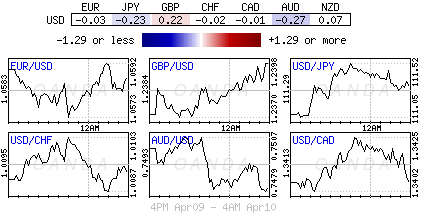Monday April 10: Five things the markets are talking about
Capital markets are showing resilience this morning in the face of last Friday’s weaker than expected non-farm payroll report (NFP) and heightened geopolitical tensions, with demand for haven assets fade a tad.
While the U.S jobs report was weaker than some had expected, it’s consistent with the U.S. economy growing at +2% this year, the miss is being shrugged off as a one-off due to weather impact.
Nevertheless, geopolitical risk remains a concern in the wake of Syria strikes last week as a U.S destroyer approaches the Korean peninsula.
Last week’s meeting between China President Xi and President Trump is being viewed as a success. The world’s largest economy has reportedly offered improved market access for U.S financial sector investments and beef exports in a move to avert a trade war.
In Europe, this week features price data from several countries including the U.K, Germany, France and Italy. Given the ECB’s focus on its inflation target, this data will be important for the Bank’s policy assessment later this month.
Elsewhere, China will release price data along with its merchandise trade numbers, while both Australia and the U.K release their respective jobs report.
In North America, the biggest news is likely to be Friday’s U.S retail sales report where no change is expected (+0.2%). On Wednesday, the BoC publishes its monetary policy announcement.
1. Global equities see mixed response to geopolitical tensions
Global stocks are starting this holiday-shortened week stuck in neutral ahead of U.S. earnings season.
Note: Stocks have traded flat over the past month as investors, after the +10% rise since last November’s lows, have taken valuations above the long-term averages – 16 times forward earnings, compared to a 15-year average of about +14 times.
In Japan, the Topix index rose +0.7%, advancing for a second day, while the Nikkei was up on a weak yen (¥111.30) with financials outperforming on rising U.S yields.
Elsewhere, the Aussie S&P/ASX 200 Index added +0.9%. In Hong Kong, the Hang Seng index fell -0.1%, while China’s Shanghai Composite slipped -0.5%. In South Korea, the Kospi index declined -0.9%, dropping for a fifth consecutive day for the longest losing streak in 10-months.
In Europe, equity indices are trading generally lower. Banking stocks are trading mixed in the Eurostoxx despite while commodity and mining stocks are lower in the FTSE 100.
U.S stocks are set to open in the ‘black’ (+0.1%).
Indices: Stoxx50 -0.3% at 3,483, FTSE flat at 7,351, DAX -0.1% at 12,210, CAC-40 -0.5% at 5,110, IBEX-35 -0.4% at 10,486, FTSE MIB -0.2% at 20,252, SMI -0.5% at 8,599, S&P 500 Futures +0.1%
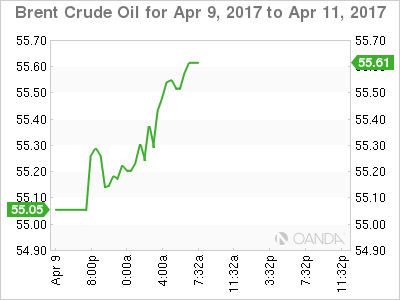
2. Oil up on strong demand, uncertainty over Syria, gold lower
Currently, oil prices are being supported by strong demand and uncertainty over the conflict in Syria. For the time being, a run-up in U.S drilling activity is keeping a lid on these gains.
Brent crude futures are at +$55.49 per barrel, up +25c, or +0.45% from Friday’s close, while U.S West Texas Intermediate (WTI) crude futures are up +25c, or +0.46% at +$52.48 a barrel.
However, another increase in U.S. oil drilling – for the twelfth consecutive week and taking the count to 672 rigs, which is the highest since August 2015 – is keeping investors from breaking last week’s one-month highs of over +$56 per barrel.
Note: Although Syria has limited oil production; its location in the Middle East and alliances with big oil producers raises concerns about spreading conflict that could disrupt crude shipments. Both Russia and Iran, staunch allies of Syria, condemned the attacks.
In oil supply fundamentals, the market remains oversupplied, even with efforts led by the OPEC to cut supplies to support global prices.
Gold prices remain steady (unchanged at $1,253.86 per ounce) with growing geopolitical tensions continuing to drive safe-haven demand.
Yesterday, aides to Trump differed on where Syrian/U.S policy was heading. However, U.S Secretary of State Tillerson has warned that the Syrian strikes are a warning to other nations, including North Korea.
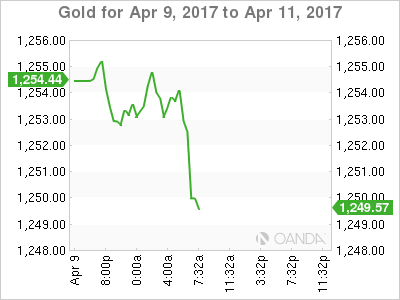
3. French debt still an issue
Data from the Japanese MoF overnight showed record selling of French government bonds by domestic investors in February. Investors sold -¥1.504T of French debt or OAT’s that month.
It was by far the most heavily sold government bond asset in Japan, as net selling of U.S Treasury’s – the second most heavily sold asset – amounted to just +¥127B. The French are heading to the polls to elect a new president on April 23. The second round is scheduled for May 7.
Note: Some market participants continue to forecast more selling. Currently, French/Bund spread is at +70 bps, off from February’s high of +80 bps.
Elsewhere, the yield on 10-year Aussie bonds backed up +2 bps to +2.57%, while U.S 10’s fell -1 bps to +2.37%, after climbing +4 bps on Friday.
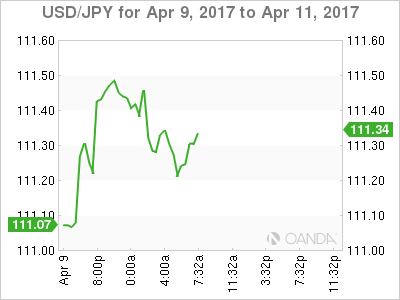
4. The ‘mighty’ dollar finds geopolitical support
Aside of geopolitical support, the USD is finding support from Fed rhetoric.
The Fed’s typically more ‘dovish’ voter Dudley, whose recent comments are being perceived to be increasingly more ‘hawkish.’ Also, Fed member Bullard also noted that the underwhelming U.S jobs report fro March is in line with their view of +2% inflation and modest growth.
Ahead of the U.S open, the USD is trading atop of its three-week high, aided by geopolitical risks. The EUR (€1.0577) is a tad lower despite continued improvement in the regions confidence data. Data this morning showed that Sentix climbed to 23.9 vs. 20.1e.Teh single unit continues to be pressured by regional political concerns ahead of the French elections. USD/JPY is higher, up +0.3% at ¥111.35 aided by Fed’s Dudley affirmation that the Fed was getting closer to shrinking its balance sheet.
Elsewhere, South Korea’s won (KRW) fell -0.7%, sinking for a fifth consecutive day and the longest losing streak this year, while the AUD fell -0.2% (A$0.7489) after February home-loan data was weaker than expected.
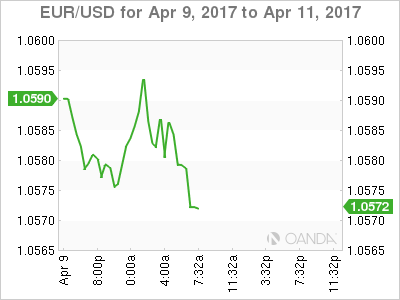
5. Euro implied volatility surges on new French polls
Market nerves over the outcome of the France’s presidential election have increased this morning after the far-left politician Jean-Luc Melenchon jumped in the latest polls, making the election a ‘viable’ four-way contest. This is supporting the probability of a second-round contest between the Communist-backed candidate and the anti-euro Marine Le Pen.
French/Bund spreads have widened + 3 bps, while the CAC (-0.5%) coming under renewed pressure.
Note: Emmanuel Macron remains the front-runner. Current polls show him tied with Marine Le Pen in the first round of the election, on April 27, but trouncing the National Front leader by -20% in the May 7 runoff.
Note: Liquidity heading into the Easter holiday in Europe is expected to exacerbate the moves in rates and currency markets.
